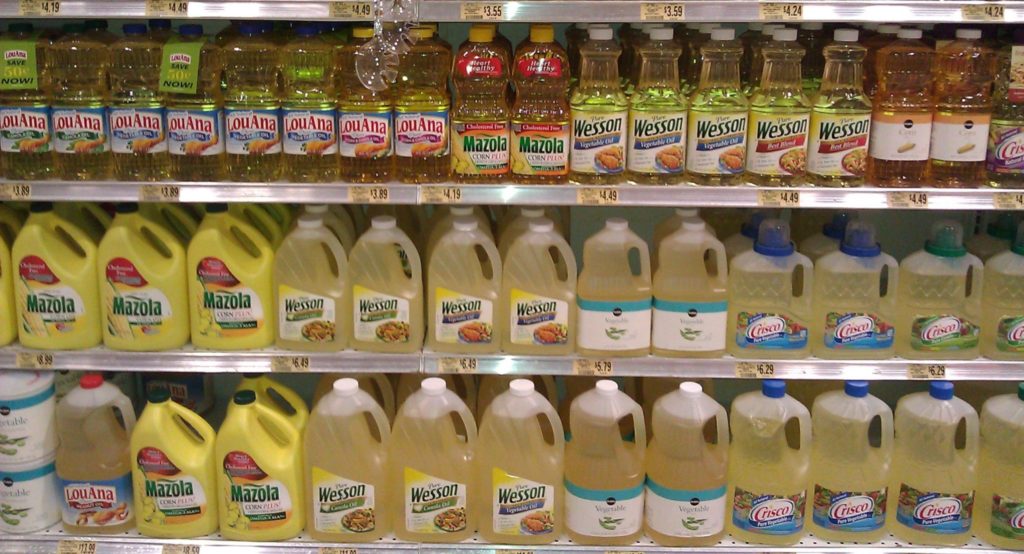Discussion of how consumption of processed seed oils triggers similar neurological pathways as smoking weed to increase appetite and food intake to make us fat.

Did you know that vegetable oils in the diet not only contribute to health problems but are a big contributor to weight problems too?
Even the so-called heart-healthy vegetable fats like grapeseed oil should be avoided!
As you can see from the photo above, the cooking oils section of the supermarket is overloaded with these types of fats.
These unhealthy lipids also include Smart Balance and other “natural oil blends” in tubs in the refrigerated section. They are, in essence, nothing more than rebranded versions of toxic margarine.
These factory fats are expanding your backside with every spread of the knife on your morning toast whether you realize it or not.
Omega-6 Seed Oil Dangers
The reason behind vegetable, aka “seed” oils and weight gain is the type of fat they contain…omega-6.
Other names for this type of fat are linoleic acid or polyunsaturated fatty acids (PUFAs).
Note that these factory fats are very different from inflammation-lowering gamma linolenic acid in organ meats and a few other foods. This special kind of omega-6 fat (that acts like an omega-3) actually helps you lose weight.
Are you confused yet?
The rancid seed oils that constitute the primary fats in the Western diet come from soy, corn, rice bran, cottonseed, sunflower, safflower, and canola (which also contains rancid omega-3 fat).
While eating seeds and grains in whole food form is not a bad thing, concentrating the oils from them is.
The fact is that there isn’t a whole lot of oil in an ear of corn or a soybean.
Thus, to make an entire bottle of corn or soybean oil takes violent and heavily industrialized processing.
Suffice it to say that you would be hard-pressed to duplicate it in your home kitchen like the ease of churning cream into butter!
Seed Oils and the Munchies
Here’s where the “fat” part comes in.
While a very small amount of omega-6 fats is necessary for health, when consumed in excess as happens with the Western diet, vegetable oils contribute to the overproduction of neuromodulatory lipids.
These substances are called endocannabinoids and are responsible for signaling hunger to the brain.
Guess what these lipids do?
They give you the munchies!
You may notice that the word endocannabinoids is similar to the etymology of cannabis (weed). Weed is famous for giving people the munchies too.
Thus, it doesn’t seem too much of a stretch to consider seed oils as the marijuana of fatty acids.
Now you know why you can’t stop eating a jumbo bag of chips or a box of cookies made with corn, soy, sunflower, or any other high omega-6 seed oil.
What about that organic dressing loaded with omega-6 oils drizzled on your salad at lunchtime?
Could it be a contributing reason for the urge to overeat on the main course or the snack attack at 3 pm?
Traditional Fats Cause Satiation, Not Overeating
Just try to gorge yourself the same way with a box of cookies made with butter or coconut oil.
Even French fries traditionally cooked in beef fat (tallow) are difficult to overeat.
You see, whole natural fats like tallow satiate you and keep your blood sugar steady.
The result is that you stay full and comfortable for longer in addition to eating much less in the first place!
Vegetable oils, on the other hand, stimulate you neurologically to keep eating far beyond what constitutes a healthy portion.
What’s most troubling is that food manufacturers are doubling down on the vegetable oil scam.
Instead of switching their products to better fats, they continue to use the most damaging (and profitable) ones.
Adding insult to injury, manufacturers market some of these munchie-inducing fats such as CLA safflower oil as a weight loss aid!
It seems with America’s weight problem now at a crisis level, it’s time for a return to the traditional fats of our ancestors.
Isn’t it high time to stop listening to the talking heads on TV and take matters into your own hands?
Do a pantry cleanout and chuck every item that contains fats that require a literal factory to process.
Your stomach and your backside will thank you!
Get the Skinny on Fat
My book Get Your Fats Straight details the whole story about what fats to eat for optimal health and what fats to avoid in an easily understandable, comprehensive format.
References
(1) Why Women Need Fat, William Lassek MD
(2) Dark Calories: How Vegetable Oils Destroy Our Health, Cate Shanahan MD








Leave a Reply